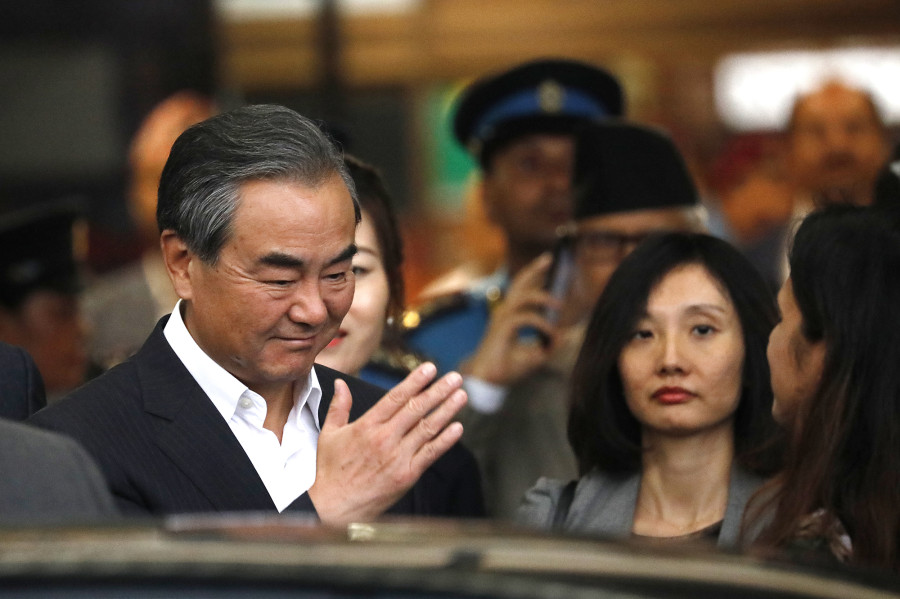National
Chinese foreign minister to discuss implementing past agreements and gauge possibility for Xi Jinping’s visit
Wang Yi’s meetings with government officials and political leaders are likely to revolve around a possible visit in October by the Chinese president, officials say.
Anil Giri
State Councilor and Foreign Minister of China Wang Yi arrived in Kathmandu on Sunday on a three-day official visit, largely perceived to be a precursor to the visit of Chinese President Xi Jinping, possibly in mid-October.
According to the Ministry of Foreign Affairs, Wang has a hectic schedule of meetings lined up for Monday and Tuesday. He will call on President Bidya Devi Bhandari, Prime Minister KP Sharma Oli, Nepali Congress President Sher Bahadur Deuba and former prime minister Pushpa Kamal Dahal, among others.
Wang will begin his official engagements on Monday afternoon by holding delegation-level talks with Foreign Minister Pradeep Gyawali, which will then be followed by three letters of exchange that were agreed upon during President Bhandari’s visit to China in April.
“Our talks will focus on bilateral economic cooperation and how we can expedite pacts and agreements signed in the past,” Gyawali told the Post. “We will also discuss how we can implement projects under the Belt and Road Initiative in a time-bound manner.”
In March 2017, Nepal and China had signed a bilateral pact on One Belt One Road—now known as the Belt and Road Initiative—in Kathmandu. Nepal had then formed two committees headed by the foreign and finance secretaries to identify projects under the framework. Initially, Nepal had identified 36 projects under the BRI framework, but that number was later trimmed down to nine as per Chinese suggestions.
“We will discuss the modality around which these projects can be implemented.,” said Gyawali. “We may try to come up with a mandate and work plan for these projects in order to expedite them.”
Gyawali dismissed any plans, as suggested by some experts and political leaders, to constitute a high-level executive committee to implement projects under the BRI.
“We have several mechanisms at various levels. So there is no need to have a separate high-level mechanism in order to execute projects under the BRI,” said Gyawali.
Among the nine projects, the establishment of the Madan Bhandari University in Chitlang, Makawanpur, will be given priority, according to sources at the Foreign Ministry.
“Among the projects proposed to China, I would like to reiterate that the establishment of a new-world class university named after the people’s leader, Madan Bhandari, is our highest priority,” reads the president’s talking note, a copy of which was obtained by the Post. “We would appreciate it if it is included in the plans for building 100 universities under the BRI. A project proposal to this effect has already been shared with the Chinese side.”
After completing delegation-level talks, Gyawali and Wang will witness the signing of three letters of exchange whose funds will be channelled through the Chinese aid announced during Bhandari’s visit to China in April.
The Chinese government had announced Rs17 billion (1 billion RMB) in aid to Nepal to execute various projects.
According to the Ministry of Foreign Affairs, China has agreed to provide a grant of Rs356 million (22 million RMB) to construct a hospital in Manang. China will also provide 5,000 tents amounting to Rs17 million (1 million RMB) to the Ministry of Home Affairs for emergency purposes.
Discussions will also be held on a proposal forwarded by the Education Ministry for Chinese volunteers to teach the Chinese language in Nepali schools. In 2014, Nepal and China had agreed that Nepal would facilitate programmes for volunteer Chinese language teachers in Nepal. During the visit of Prime Minister KP Sharma Oli to China last year, the Nepali side had reaffirmed its commitment.
Similarly, Wang will also announce 1 million RMB in relief for flood-affected areas, primarily in the Tarai.
Wang’s meeting with other government officials and political leaders are likely to revolve around gauging political consensus and creating a positive environment for the Chinese president’s visit to Nepal, which hasn’t happened yet despite the Nepali leadership’s repeated invitations.
Though China has not confirmed whether Xi will visit Nepal, speculations are rife that the Chinese president may stop off in Kathmandu on his way back to Beijing after meeting with Indian Prime Minister Narendra Modi in India in mid-October. At least two senior Nepali officials the Post spoke to said that one of the prime objectives of Wang’s visit is to lay the ground for a high-level visit.
There is yet another window in October for Xi to visit Nepal, an official at the Ministry of Foreign Affairs told the Post on condition of anonymity because he was not allowed to speak to the media. According to the official, Xi may visit Kathmandu after completing his engagements in Tibet to mark 60 years of reforms in the autonomous region.
After Kathmandu, Wang, who is leading a 15-member delegation, will be flying to Pokhara and on to Muktinath for a scenic tour, if weather permits, according to officials at the Ministry of Foreign Affairs. Wang, who arrived in Kathmandu from Pakistan, will fly home on Tuesday.
***
What do you think?
Dear reader, we’d like to hear from you. We regularly publish letters to the editor on contemporary issues or direct responses to something the Post has recently published. Please send your letters to [email protected] with "Letter to the Editor" in the subject line. Please include your name, location, and a contact address so one of our editors can reach out to you.




 31.5°C Kathmandu
31.5°C Kathmandu














